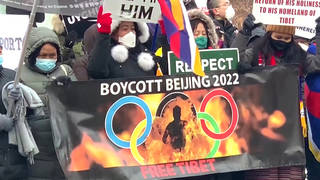
Related
Guests
- Helen ZiaChinese American feminist activist and journalist. She is the author of Asian American Dreams: The Emergence of an American People. She also co-authored a book with Los Alamos scientist Wen Ho Lee called My Country Versus Me. She took part in the Olympic torch relay when it came to San Francisco earlier this year.
In a piece called “Why I Will Carry the Olympic Torch,” Helen Zia wrote earlier this year, “A peaceful and better world is possible through friendly engagement and mutual understanding, not violent confrontation and polarization. It’s an Olympic message, a possible dream that our global civilization and everyone who is a part of it can aspire to — and for which I am proud to carry a torch.” [includes rush transcript]
Transcript
AMY GOODMAN: The international scrutiny on China has raised a dilemma for activists seeking to promote Chinese civil liberties while not aiding self-serving critics who use China to deflect attention from human rights abuses carried out by countries like the United States.
Helen Zia is a Chinese American feminist activist and journalist, author of Asian American Dreams: The Emergence of an American People, also co-authored the book My Country Versus Me about Wen Ho Lee, the nuclear scientist of Chinese descent falsely accused by the Clinton administration of spying for the Chinese government.
Despite her outspoken criticism of the Chinese government, Helen Zia took part in the Olympic torch relay earlier this year in San Francisco, its only North American stop. The torch run was steeped in controversy, as thousands of protesters gathered to demonstrate against the Chinese government.
In a piece called “Why I Will Carry the Olympic Torch,” Helen Zia wrote, “A peaceful and better world is possible through friendly engagement and mutual understanding, not violent confrontation and polarization. It’s an Olympic message, a possible dream that our global civilization and everyone who is a part of it can aspire to — and for which I am proud to carry a torch.”
Helen Zia joins us on the phone now from her home in Oakland, California. Helen, your thoughts on the protests and the Olympics taking place in China?
HELEN ZIA: Well, good morning, Amy. I —-
AMY GOODMAN: It’s good to have you with us.
HELEN ZIA: Hi. As somebody who’s been on many protest lines myself, I have to say I cheer on these protesters and, really, their courage to go to China and do the -— raise the banner and climb these polls so close to the Bird’s Nest. I think gigantic events like the Olympics really are opportunities for activists for every cause to bring attention, and so I really think that that’s one of the positive things, I guess we can say, about the Olympics. And I felt the same thing about carrying the torch, that I was glad the protests were happening around the world and bringing attention to all the wrongs that are taking place in Tibet and elsewhere because of China.
But I also do think that situations are more complicated than saying one position is all right and one, you know, country is all wrong. And that’s something that, you know, we make — we need to make a distinction between political theater and political drama that protests can make. And then, where do we take a dialogue? And after running the torch, I have to say that I felt kind of depressed, because I saw very little dialogue on either side and really just more polarization, that I personally put squarely at the foot of the Bush administration for beginning this whole fundamentalism that we’re in, not just with China, but around the world, that you’re either evil or good, and if you’re against me, you’re evil. You know, it’s either my way, or we’ll blow you off the face of the earth. And I do think that even as activists, that things are getting more and more polarized.
Where do we take a dialogue around Tibet? How do we reach the 1.3 billion people in China, many of whom are protesting internally against their own government, you know, as activists? You know, I spent six months in China and met people who are part of a leftist movement in China and very much disagreeing with their own government. So, you know, where do we reach some of those people, who can really make a change in China for the betterment of people in Tibet, as well? So, those are some of my thoughts right now.
AMY GOODMAN: Are you watching the Olympics?
HELEN ZIA: I’ve watched some of it, yes.
AMY GOODMAN: And your thoughts on President Bush going to attend the Olympics ceremony?
HELEN ZIA: Well, it certainly is seeing one torturer speaking to another — isn’t it? — when suddenly we see President Bush talking about freedom of the press and the right to be political dissidents and labor rights, for God’s sake, when this is the president who has done more to trample on the Constitution and civil liberties than any other president in modern history. This is really quite a show, I think.
AMY GOODMAN: Helen Zia, I want to thank you very much for being with us, writer, author, feminist, Chinese American, author of Asian American Dreams.












Media Options